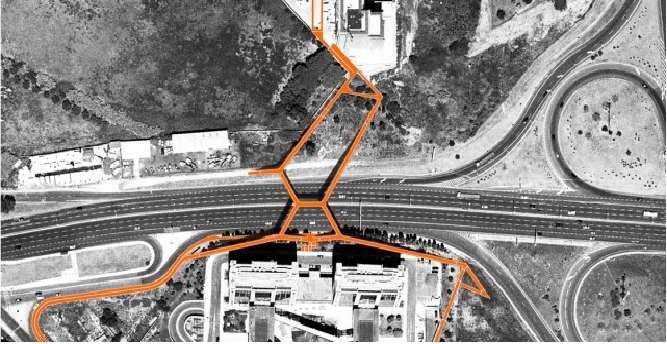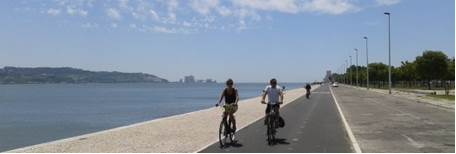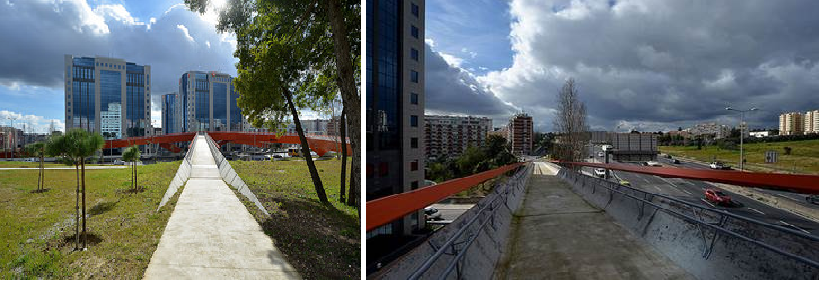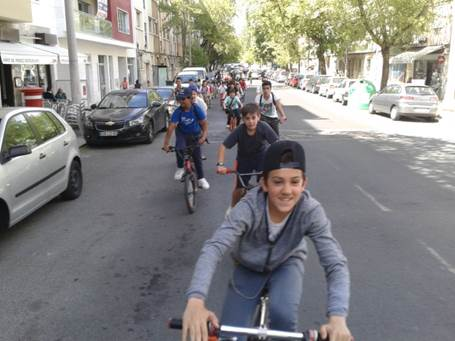
Portugal's delayed pedal revolution
2014 was a busy year for ECF-members MUBi and FPCUB - With so much going on in bicycle advocacy in Portugal, when will the full pedal revolution take effect in the EU's westernmost country?
2014 was definitely the busiest year for bicycle advocates in Portugal, starting off with a new pro-bicycle Road Code effective in January, numerous bicycle activities and programs realised in various cities, and bicycle mobility finally entering the political agenda at various levels. Hopefully results will be visible in 2015, which should be even busier and more promising with ECF-members MUBi growing in participants and activities, and FPCUB implementing the EuroVelo 1 - Atlantic Coast Route this year, amongst other nationwide initiatives.
Political commitment to improving bicycle mobility still lagging behind in Portugal
Nonetheless, and despite the advocacy, major overall results are still far from assured. For example, 2015 is the year when Lisbon's bike share scheme is supposed to be launched, but details and dates are still unknown. On the other hand, the city's 60 km predominantly greenway-based bicycle routes should expand into the heart of the city's denser urban areas, along Lisbon's main traffic arteries, but visible plans are still to be released, and details or plans haven't been released yet either by the mayor António Costa, or the Lisbon's mobility department (DMMT). In the meantime connectedness in comfortable and safe bikeways, accomodating to all kinds of bicycle users are not assured throughout, since the city's urban areas remain under served, except for a mostly peripheral skeleton network connecting to green spaces and the river-front. Hard measures on the ground, pervasive car-speed and traffic restrictions such those seen in other Western EU capitals, or even visible plans, are still to be seen from Lisbon municipality, and even more so from other municipalities in the metropolitan area or other Portuguese cities.
Both MUBi and FPCUB have been important catalysts for increasing public participation for greater bicycle use, but for the most part, Portuguese politicians are still lagging far behind their Western European counterparts, when it comes to bicycle (or even pedestrian) mobility. In many public participatory budgets for example, the population has voted for more municipal investment in bicycle infrastructure, especially in Lisbon and its metropolitan suburbs such as Cascais and Oeiras. Despite recent victories, results and important tangible measures from the authorities are still to be seen. In some cases, visiting specialists from cities with similar features and problems - such as Timothy Papandreaou from San Francisco's Municipal Transportation Agency, or the CycleCities program workshops in Lisbon received great involvement, and even good press with prime national TV coverage, bringing in a great deal of attention and more awareness to urban bicycle mobility. Regardless, no significant hard measures have been implemented so far, not even small measures with a large impact such as bicycle parking at all public buildings, bicycle routes on BUS lanes, bicycle-ramp stairs, or large-scale introduction of contraflows and bike-boxes on city streets. Many of these measures won public participatory budgets, and should have a budget allocated, but municipal response to the needs of cyclists has been extremely slow and tame.
Soft measure campaigns paving the way for change
On the other hand, numerous soft measure events such as the successful Bike-to-School campaign throughout Lisbon - jointly organised by MUBi and Lisbon's municipal environmental agency, LisboaENova - had some impact and grabbed the public eye last year, involving hundreds of students and teachers at various public and private schools in the city. This initiative paved the way for a national "bicycling for all" initiative currently being launched by the Portuguese sports cycling federation (FPC) encompassing schools nationwide; FPC has also signed a protocol for cooperation with ECF-member MUBi.
Also on a positive note, Lisbon inaugurated it's 8th bicycle-pedestrian bridge last week, an impressive structure partially sponsored by the country's largest petrol company, spanning over a busy freeway and connecting various city neighbourhoods and an important business park into the city's bikeway network.
 Plan of the new bike bridge and bikeway integration - Photo: Adão da Fonseca, Engenheiros Consultores via Lisbon Cycle Chic
Plan of the new bike bridge and bikeway integration - Photo: Adão da Fonseca, Engenheiros Consultores via Lisbon Cycle Chic
Other examples where public pressure remains high for safer interconnected bike routes exist nationwide, especially in the greater Lisbon area; the Ciclovia na Marginal initiative for example had won a public budget proposal, with an unprecedented number of votes but was unduly ruled out by Oeiras municipalitys' car-centred mayor, Paulo Vistas. Instead Paulo Vistas inaugurated a 900m unfinished greenway along the coast connecting nowhere so far, but this attempt to quiet public questioning of the lack of bicyle infrastructure in Oeiras resulted in even greater public discontent, as can be attested by comments on the municipality's own facebook page, but especially in press coverage on national tv, radio, news and local opinion articles.
Just before the boost that Springtime brings to bicycle use, the real question remains: With all of the changes and advocacy going on over the last year, including important soft measures such as the new road code or locally held programs such as "bike to school" and "bike to work", will the full effect of the pedal revolution happen at an administrative and infrastructural level in Portugal? If so, when?
- Log in to post comments
Contact the author
Recent news!
Upcoming events
Contact Us
Avenue des Arts, 7-8
Postal address: Rue de la Charité, 22
1210 Brussels, Belgium












